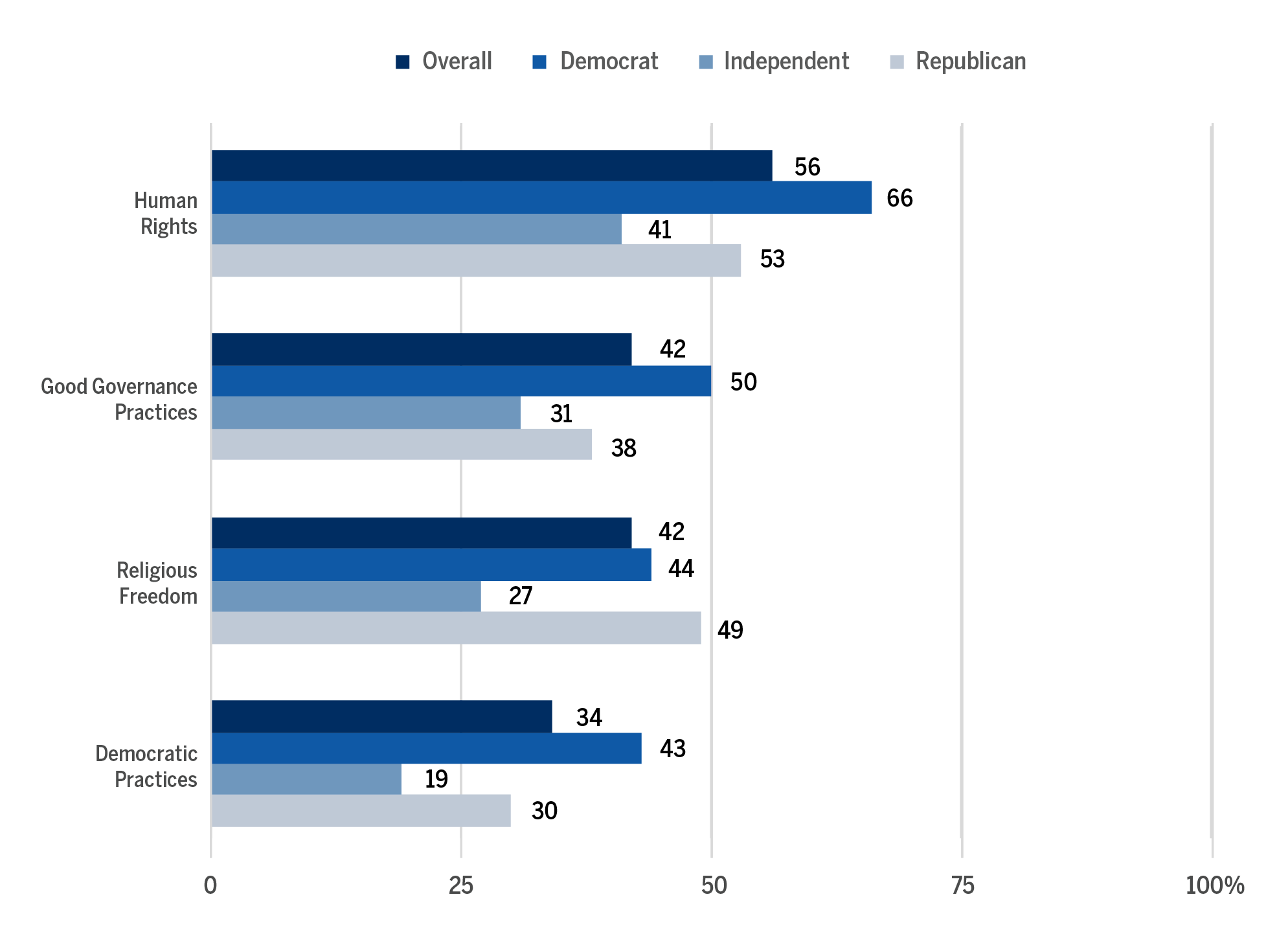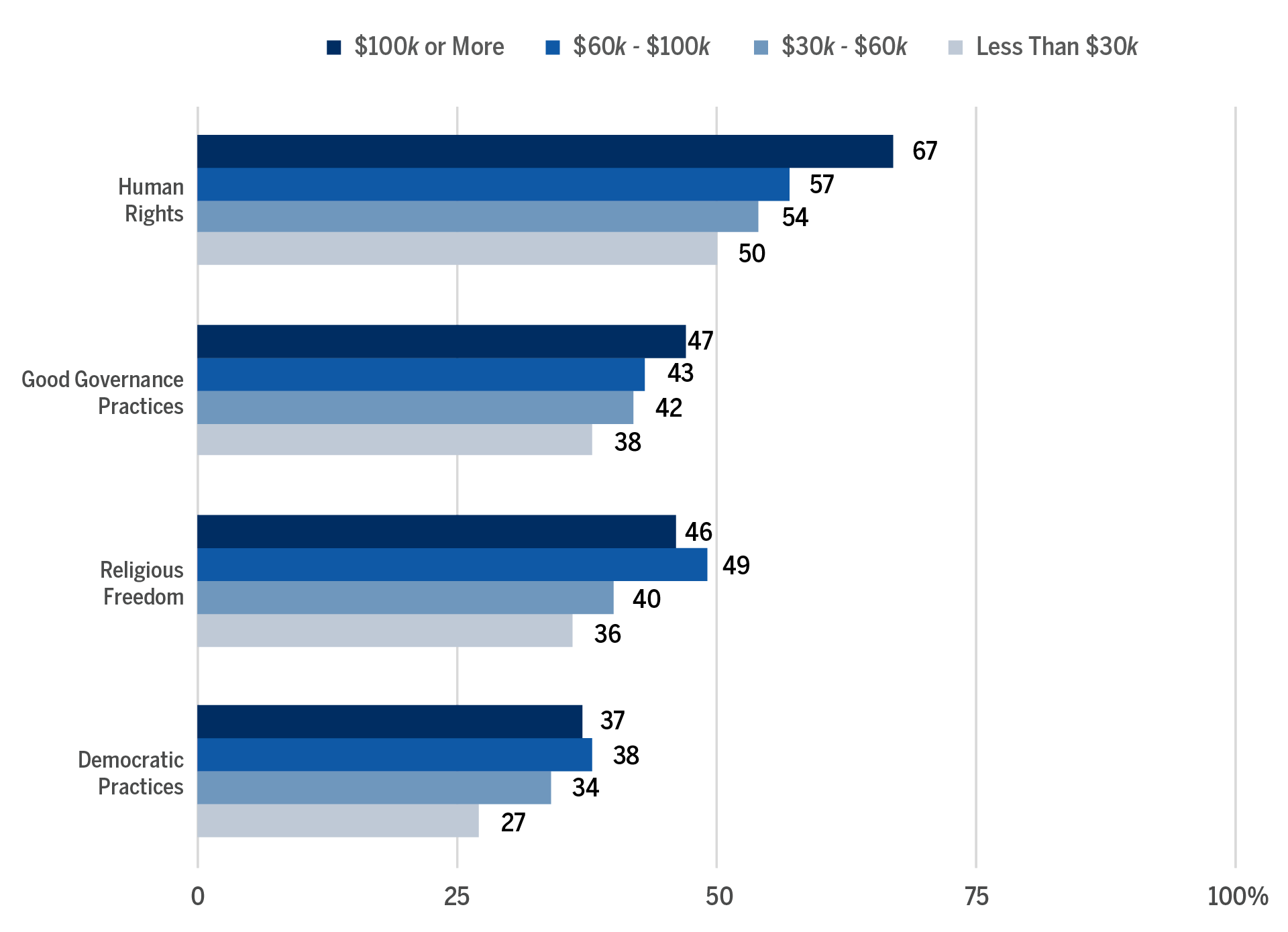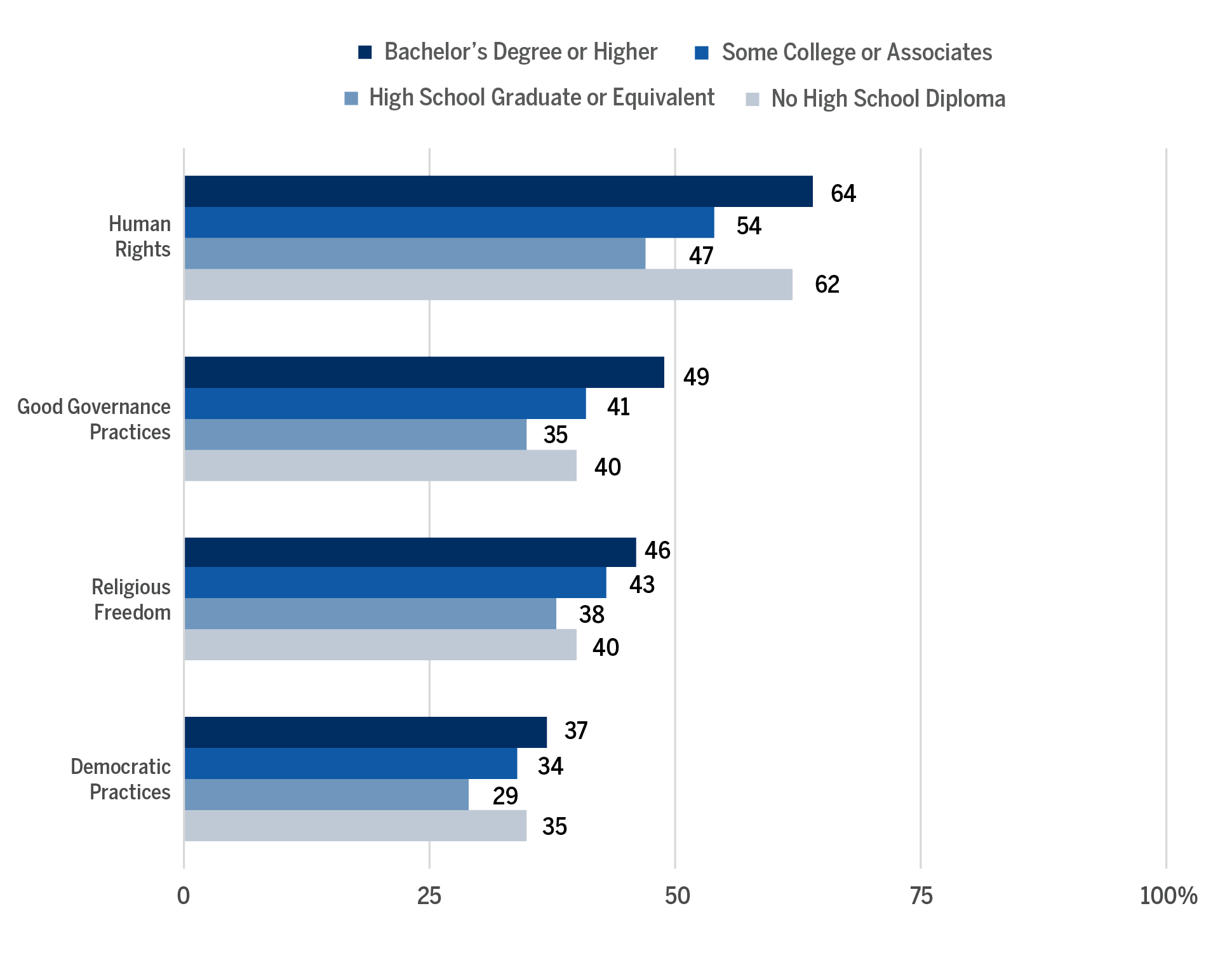The following article is part of an ongoing series of analyses based on the recent Asia Matters for America Public and Elite Opinion poll. See all articles in the series here.
The genocide of Rohingya Muslims in Myanmar, political prison camps in North Korea, censorship, and authoritarian overtures in China and treatment of the Uighur population in Xinjiang have caught considerable public and media attention in the United States.
Americans’ views on the United States’ foreign policy vary across politics and regions. However, promotion of human rights abroad is an agenda with wide, consistent support. A recent poll conducted by NORC at the University of Chicago on behalf of the East-West Center reveals 56% of the general population believes it is very or extremely important for the United States to promote human rights in Asia. This figure is even higher (79%) among polled elites[1] comprised of local elected and appointed officials, bureaucrats, and business leaders.
Percent of Adults who say it is extremely of very important for the United States to promote:

In the general population surveyed, 42% reported promotion of religious freedom in Asia was very or extremely important for the United States. The same percentage also reported promotion of good governance was very or extremely important. Among the 4 categories polled, (human rights, good governance, religious freedom, and democratic values), democratic practices were the least important and human rights the most important to the general population.
The bipartisan support for human rights (66% Democrats and 53% Republican) is consistent with results from a similar Pew poll conducted in February 2021, which found 69% of Democrats and 72% Republicans favored promoting human rights in China, even if it hurt Sino-US economic relations. Democrats were most likely to favor promotion of human rights, good governance practices, religious freedom, and democratic practices in Asia compared to Republicans. However, in terms of promoting religious freedoms, more Republicans responded in favor compared to Democrats.
Human Rights
Though there is broad support for human rights promotion, the poll found in the general population that Democrats (66%) were more likely to support human rights than Republicans (53%). Additionally, individuals who believed Asian Americans hold similar values were more likely to want to support of human rights in Asia (66%) in comparison to those who believe Asian Americans have different values (46%). Those who believed US military presence should increase in Asia were more likely to be supportive of human rights promotion (66%), versus those who believed military presence should be the same (55%) or decrease (52%). Regionally, those in the Western[2] United States (65%) were more supportive of human rights promotion in comparison to those from the Northeastern United States (56%).
More than half the respondents across all ages said promotion of human rights was very or extremely important, with the highest numbers among those 60 years and older (60%) followed by 30-44 age group (58%).
Percent of adults from different household incomes (USD) who say it is extremely or very important for the United States to promote:

Household income is closely tied to perceptions of human rights promotion. A large majority (67%) of respondents in households making $100,000 or more saw human rights as very/extremely important, while 50% of those making $30,000 or less were of the same view. Sex, education, and racial identities did not seem to impact the perception of human rights.
Good Governance
On promoting good governance, Democrats (50%) were more likely to report support than Republicans (38%). Those who believe Asian Americans share the same values (47%) were more likely to support good governance than those who believe that Asian Americans have different values (36%). Respondents from the Western part of United States (46%) were more likely to support the promotion of good governance in Asia than those from the Northeast (40%).
Household income was once again positively correlated with promotion of good governance. An increase in income was associated with an increase in support for promotion of good governance. Education, age, and racial identity did not seem to impact views on promotion of good governance substantially.
Percent of adults from different educational backgrounds who say it is extremely or very important for the United States to promote:

Religious Freedom
Interestingly, on the question of United States promoting religious freedom in Asia, Republicans (49%) were more likely to be supportive than Democrats (44%). Also, respondents from the Western United States (52%) were more likely to support of promotion of religious freedoms than those in the Northeast United States (33%).
The same was true for Black individuals (49%) as opposed to White (41%) or Hispanic (40%). Respondents who support an increase in military presence in Asia (52%) were more likely to support promotion of religious freedoms in Asia than those who thought military presence should decrease (37%). Individuals who believe Asian Americans share the same values (47%) were more likely to say promotion of religious freedoms in Asia was important compared to those that believed that Asian Americans did not share the same values (37%). More years of education, greater household income and being older also had an association with greater support for the promotion of religious freedom in Asia.
The poll found 25% of respondents, a sizeable minority, said promoting religious freedom was not at all or not too important. This aligns with the Pew poll which found a similar percentage of individuals (26%) who said promoting economic ties with China was more important than human rights.
Democratic Practices
Among the list of values polled, the promotion of democratic practices had the most mixed responses. Survey respondents generally thought promotion of democratic practices was somewhat important (39%) and not very or extremely important (34%). More Democrats (43%) as opposed to Republicans (30%) valued promoting democratic values, as did those from Western United States (38%) as opposed to Northeastern United States (29%).
Individuals who believe US military presence in Asia should increase (40%) were more likely to support promotion of democratic practices in the region as opposed to those who believe military presence should decrease (27%). Across all ages and household incomes, the bulk of respondents valued promotion of democratic practices as somewhat important. However, support was correlated with income and rose with higher income brackets. These beliefs did not vary substantially across states nor were they impacted by employment status or age.
Takeaways
One key takeaway from this survey is promotion of human rights is important to the American population across party lines. However, important demographic differences exist. Promotion of religious freedom was the only category of the four polled where more Republicans were supportive than Democrats. Household income was correlated with support for promotion of human rights and freedoms in Asia. High earning individuals tended to be more supportive across all four human rights categories than individuals at the lower end of the income scale.
More years of education was also associated with support for human rights promotion in Asia. Respondents with a college degree or some college education had more supportive perceptions across the four categories. The beliefs that Asian Americans hold similar values, and military presence should be increased in Asia also correlated with greater support across the four polled themes.
Age, often thought of as salient and deterministic of attitudes, turned out to be not an important factor to people’s perceptions of promoting the four agendas in Asia.
It is important to note this poll was conducted during the COVID-19 pandemic. An atypical time, with people facing exceptional circumstances which could influence their perceptions around foreign policy.
On one hand, stressful circumstances can bring domestic concerns to higher priority and cause a disproportionately inward looking, isolationist orientation. On the other hand, experiencing a global pandemic could also make people view themselves as global citizens and see past differences. When COVID-19 concerns at home subside, it would be interesting to re-visit these questions and compare them to findings from a survey conducted under more “normal” circumstances.
Maheen Zahid was a Young Professional at the East-West Center in Washington.
Asia Matters for America Poll Analysis is a series of short articles exploring the results of the recent survey
by the East-West Center and conducted by the NORC at the University of
Chicago on American perspectives on US-Asia relations. Authors examine a
segment of the results from the report regarding trade, tourism,
international students, immigration, human rights, national security,
and sister city relationships to attempt to understand how Americans
believe Asia matters to their state.
[1] Elites: For the purposes of this survey "Elites" is defined as
elected and appointed officials, bureaucrats, and business leaders.
1,446 people representing these three sub-categories answered the
survey.
[2] Please refer to the map on page 4 of the report.